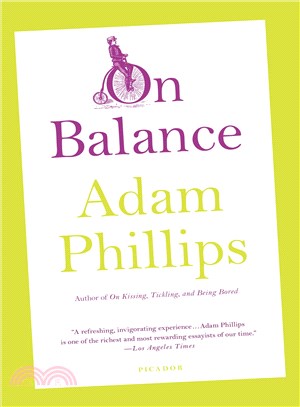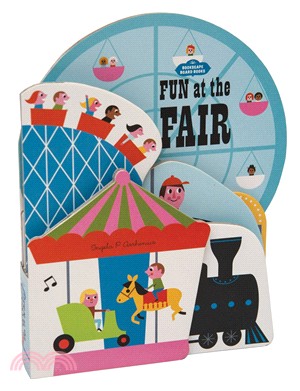On Balance
商品資訊
ISBN13:9780312610746
出版社:St Martins Pr
作者:Adam Phillips
出版日:2011/11/22
裝訂/頁數:平裝/314頁
規格:21.0cm*14.0cm*2.5cm (高/寬/厚)
商品簡介
作者簡介
名人/編輯推薦
書摘/試閱
相關商品
商品簡介
The psychological and philosophical implications of balance and excess are here explored by “one of the richest and most rewarding essayists of our time” (Los Angeles Times)
Every day, we are told that balance is a good thing. We are supposed to make balanced judgments, balance our budget, and preserve a balance of power in our government. Disturbed people are described as unbalanced. In this insightful, charming book, the philosopher and psychoanalyst Adam Phillips looks afresh at balance (and its shadow, excess) and asks if achieving the former is such an admirable goal. From this perspective, Phillips examines the explosive topics of money, sex, parenthood, faith, and education. In his exhilarating and casually brilliant explorations of case studies, fairy tales, works of art, and literature, the paradoxes inherent in our appetites and fears are revealed.
Every day, we are told that balance is a good thing. We are supposed to make balanced judgments, balance our budget, and preserve a balance of power in our government. Disturbed people are described as unbalanced. In this insightful, charming book, the philosopher and psychoanalyst Adam Phillips looks afresh at balance (and its shadow, excess) and asks if achieving the former is such an admirable goal. From this perspective, Phillips examines the explosive topics of money, sex, parenthood, faith, and education. In his exhilarating and casually brilliant explorations of case studies, fairy tales, works of art, and literature, the paradoxes inherent in our appetites and fears are revealed.
作者簡介
Adam Phillips is a psychoanalyst and and a visiting professor in the English department at the University of York. He is the author of many acclaimed books, including On Kissing, Tickling, and Being Bored; Going Sane; and On Kindness (with Barbara Taylor).
名人/編輯推薦
"A refreshing, invigorating experience...Adam Phillips is one of the richest and most rewarding essayists of our time." -Los Angeles Times
"Highly pragmatic...Phillips's authority as a writer comes in no small part from his own experience as a highly regarded therapist....Like a priest, he is concerned with damnation and salvation, under the secular names of sickness and cure." -Adam Kirsch, The Boston Globe
"Transformative...Phillips can tease out contradictions with extraordinary delicacy....He shows that pleasure and desire are not simple; they can be feared...and used to hide things we should really see."
-The Guardian (London)
"Gently provocative reading on themes of need and desire...Phillips's ideas are fresh and inventive, casting new light on counterintuitive topics from the psychological importance of punishment to the questionable pursuit of happiness." -Financial Times
"A set of beguiling essays...the author provides polished ponderables for all readers." -Kirkus Reviews
"Highly pragmatic...Phillips's authority as a writer comes in no small part from his own experience as a highly regarded therapist....Like a priest, he is concerned with damnation and salvation, under the secular names of sickness and cure." -Adam Kirsch, The Boston Globe
"Transformative...Phillips can tease out contradictions with extraordinary delicacy....He shows that pleasure and desire are not simple; they can be feared...and used to hide things we should really see."
-The Guardian (London)
"Gently provocative reading on themes of need and desire...Phillips's ideas are fresh and inventive, casting new light on counterintuitive topics from the psychological importance of punishment to the questionable pursuit of happiness." -Financial Times
"A set of beguiling essays...the author provides polished ponderables for all readers." -Kirkus Reviews
書摘/試閱
Five Short Talks on Excess*
It is very stretchy.
Kay Ryan, 'The Fabric of Life'
I In Excess
Nothing makes people more excessive than talking about excess. We tend to become either extremely disapproving or unusually enthusiastic and excited about the most recently reported celebrity orgy, or managing director's pay rise. No one can be indifferent to binge drinking, or the amount of pornography on the internet; everyone knows someone now who has a so-called eating disorder, and everyone knows about the huge numbers of people in the world who are starving. Excess is everywhere now - excesses of wealth and of poverty, of sex and greed, of violence and of religious belief. If the twentieth century was, in the title of historian Eric Hobsbawm's book, The Age of Extremes, then the twenty-first century looks like being the Age of Excess. When people are being extreme they push things to their limits; when they are being excessive they push things beyond their limits.
I want here to explore our fear and loathing, our fascination and craving for excess in all its forms. And I want to bear in mind something very strange about excess, something best pictured perhaps by the extraordinary consumerism of Western societies, or by the religious and anti-religious fanaticism in contemporary culture; and that is that excess is contagious. Nothing makes people more excessive than talking about excess.
Like a lot of the words we use very easily, 'excess' is older than we imagine. The Oxford English Dictionary dates its earliest, most literal meaning of 'the action of going out or forth' to the fifteenth century; 'excess', in its original use, being the opposite of 'access'. And this, too, I think is something we should bear in mind: access, if you like, is the freedom to go in; excess is the freedom to go out. But when we are excessive what are we going out from?
Here, again, the dictionary can help us, and this time into more familiar territory: when we are excessive we 'depart from custom [or] reason', we 'overstep' limits, we go beyond our 'rights'; we are involved in what the dictionary calls 'extravagant violation of law, decency or morality', we are guilty of 'outrageous conduct'. When we are excessive, in whatever way, we depart from what is considered appropriate behaviour; we go out from, we abandon, the version of ourselves we are supposed to be. And where do we get our standards of appropriate behaviour, our pictures of ourselves as we are supposed to be? From the societies we grow up in. Excess, the dictionary reminds us, is not simply the violation of law, decency or morality, it is the 'extravagant violation of law, decency or morality'.
So excess covers a whole gamut of experiences from exaggeration to breaking the law, from boasting to genocide. The anorexic and the suicide bomber, the attention-seeking child and the compulsive gambler, the person who has more money than he needs and the person committed to celibacy are all involved, in their different ways, in extravagant violations of law, decency or morality; even though, of course, they may not see it this way. And this, too, is important when we are thinking about excess: what is excessive to one person may be to another person just an ordinary way of life. The devoutly religious are not, in their own view, over-doing it; terrorists are not, in their view, overreacting to the injustices they feel they have suffered. Indeed, one of the ways of describing many of our personal and political and religious conflicts is that someone is trying to persuade someone else that they are being excessive: excessively cruel, excessively disrespectful, excessively unjust. So we need to remember just how much can hang on our definitions of excess.
I want to consider here what might make us feel, in any given situation, that someone is being excessive; and what, when we feel people are being excessive, we want to do about it. Our knee-jerk reaction is often to want to punish them, and often excessively. And yet people usually punish each other when they don't know what else to do; which is why punishment is so often beside the point, an excited failure of imagination. Punishment is despair about the rules, not their enforcement. So it isn't just that excess is contagious, but that other people's excess permits us, or even frees us, to be excessive ourselves. Our reactions to other people's excesses - of violence, of appetite, of belief - are, as we shall see, extremely revealing. 'All truths,' the philosopher Alain Badiou writes, 'are woven from extreme consequences.' There are also truths woven from excessive consequences.
But perhaps one thing we shouldn't lose sight of is just how reassuring the whole idea of excess can be; when we are not permitted to take excess baggage on the plane it is because somebody is keeping an eye on our safety, somebody knows how much the plane can take. In other words, what is reassuring about the idea of excess - about our being able to think that someone is being excessive - is that it implies that we know our limits, that we have a sure sense of the proper way to behave, that we know what is appropriate and right. Every time we have the moralistic version of the excess experience - the righteous indignation, or rage, or grief about the transgressions of other people - we relocate ourselves, firmly and safely, within the rules, the protective walls, of our societies. In these moments we are reminded of how the world should be, and that someone who knows the rules and can enforce them is looking after us. The child who has a tantrum is trying to find out if his parents are robust, whether they can withstand his hatred and rage and frustration. In this instance excessive behaviour is an opportunity for the parents to remind themselves, or for society to remind itself, of established rules and regulations. It reassures us to see that we clearly know what the rules are because we are outraged when they are broken.
If we are so good at spotting excessive behaviour when we see it - excessive eating, excessive sex, excessive shopping, the excessive beliefs of religious fanatics - then we must know, or think we know, what just the right amount of these things is. If we can recognize greed when we see it, we must know how people should eat; if we can be appalled by the sexual excesses reported in the tabloids, we must know what kind of sex people should be having, and how often they should be having it; if we are full of righteous indignation about people we think of as 'religious fanatics', we must surely have very strong ideas about how much people should believe things, about what people should believe in and what their beliefs should drive them to do. But what is the right amount of belief? How do we know when someone's grief is excessive? Perhaps when it makes us feel something more excessive than we would like to feel?
There is an obvious irony here: many of the things that matter most to us - like love, or grief, or appetite, or violence, or political and religious belief - cannot be measured; and yet one of the things we are most alert to, one of the things we speak about with the most passionate conviction, is when we feel these things have become excessive. It is as if we have our own internal measure of these things that can't be quantified; and this internal measure is one of the most important things about us. How could we live without a sense of what is excessive? Indeed, as I have said, is it not striking how excessive we can be in our reactions to other people's excesses? Nothing makes us more excessive than excess; nothing makes us more disapproving, disgusted, punitive - not to mention fascinated, exhilarated and amazed - than other people's extravagant appetite for food, or alcohol, or money, or drugs, or violence; nothing makes us more frightened, more furious, more despairing than other people's extreme commitment to political ideals or religious beliefs. It is, one should notice, almost always other people who are being excessive in their belief, not oneself. 'One is never, in any way whatever, overwhelmed by another person's excesses,' the French psycho analyst Jacques Lacan once said, 'one is only and always overwhelmed because their excesses happen to coincide with your own.' From a psychoanalytic point of view other people's excesses disturb us, get us worked up, because they reveal something important to us about ourselves; about our own fears and longings. Indeed, other people's excesses might reveal to us, at its most minimal, that we are, or have become, the excessive animals; the animals for whom excessive behaviour is the rule rather than the exception (there are laws of human nature, but not for us). You only have to read the newspapers to realize that this is a plausible possibility. Our excesses may be in excess of our capacity to understand and to regulate. And if we have become the excessive animals we may have to do more than merely aspire not to be.
When Lacan suggests that we are only overwhelmed by other people's excesses because they are the same as our own he is not simply saying, for example, that our horror about drug addiction means that we are secretly tempted or prone to become drug addicts; but that drug addiction may be a picture, say, of how fearful we might be generally of our own dependence, how terrified we are of becoming enslaved to the people we need. And drug addiction can also be a picture of how tempted we are to try to become everything that the person we love needs; to become, in a way, their drug of choice. In other words, Lacan's point is that our reaction to other people's excesses is an important clue to something vital about ourselves; our reflex response to other people's excessive behaviour - the thrill of righteous indignation, the moral superiority of our disgust - is more complex and more interesting than it at first seems. If other people's excesses reveal the bigot in us, they also reveal how intriguing and subtle the bigot is. There is nothing more telling, nothing more revealing of one's own character and history and taste, than one's reaction to other people's excesses. Tell me which kinds of excess fascinate you, tell me which kinds of excess appall you, and I will tell you who you are. This would be one, excessive, way of putting it. Or one could more sensibly say: notice which excesses you are drawn to (and there is, of course, an excess of excesses to choose from now - road rage, fundamentalism, self-improvement, shopping), the ones you can't stop complaining about, the ones that make you speak out, or the ones that just give you some kind of secret, perhaps slightly embarrassing pleasure, and try to work out what about them is so compelling.
Excessive behaviour, it seems obvious to say, attracts our attention; what is perhaps less obvious is why it should do so. We are excessively interested in the excessive behaviour that interests us; and to be excessively interested is to be more interested than we would like to be. So even though it would be silly to say that our reaction to other people's excesses is the key to our nature - because there is no key to our nature - it is true to say, I think, that our reactions to other people's excesses reveal to us what our conflicts are. I don't want to be a drug addict, but I do want to be free to need someone; and I don't want to lose my life when I do need them. I don't want to be a suicide bomber, but I may want to have something in my life that is so important to me that I would risk my life for it; or I may simply want to be aggressive enough to be able to protect the people I love. Or I may even want to have the courage of my despair. The excesses of other people, and of ourselves, can make us think, rather than merely react. Indeed, something as powerful as excess might - if we can suspend our fear - allow us to have thoughts we have never had before. After all, inspiration, falling in love, conversion experiences, a sense of injustice - the most radical transformations that can occur in a life - are traditionally overwhelming, excessive experiences. Even though we often want to get over them, to get back to normal as quickly as possible. 'For the doctrine of conversion,' the Victorian classicist Benjamin Jowett wrote, 'the moralist substitutes the theory of habit.' And nothing, of course, is more excessive than a habit.
So perhaps when the poet William Blake wrote in his 'Proverbs of Hell' that 'The road of excess leads to the Palace of Wisdom', he wasn't joking? We don't tend to look to anorexics or gluttons, to the extravagantly rich or the promiscuous, for wisdom; we don't think of drug addicts or mass murderers as necessarily enlightened. So perhaps Blake was being ironic; they are, after all, 'Proverbs of Hell'. Perhaps the road of excess, through the very disillusionments it produces, is a source of wisdom; that it is not the alcoholic but the recovering alcoholic who has something to tell us. Perhaps as part of growing up we need to be excessive - to try to break all the rules just to be able to find out what, if anything, the rules are made of, and why they matter. Perhaps only the road of excess can teach us when enough is enough. (And perhaps 'perhaps' - like all our cherished rhetoric of self-doubt - is one way we temper our excesses in language.) As Blake says, in another of his proverbs, 'You never know what is enough unless you know what is more than enough.' Either certain kinds of excess are not simply good for us, but essential to our well-being; or we need to go through excessive experiences to discover what they can't do for us, to discover just how much of something we really need. But what is a Palace of Wisdom? And why would that be a good place to go to?
It is very stretchy.
Kay Ryan, 'The Fabric of Life'
I In Excess
Nothing makes people more excessive than talking about excess. We tend to become either extremely disapproving or unusually enthusiastic and excited about the most recently reported celebrity orgy, or managing director's pay rise. No one can be indifferent to binge drinking, or the amount of pornography on the internet; everyone knows someone now who has a so-called eating disorder, and everyone knows about the huge numbers of people in the world who are starving. Excess is everywhere now - excesses of wealth and of poverty, of sex and greed, of violence and of religious belief. If the twentieth century was, in the title of historian Eric Hobsbawm's book, The Age of Extremes, then the twenty-first century looks like being the Age of Excess. When people are being extreme they push things to their limits; when they are being excessive they push things beyond their limits.
I want here to explore our fear and loathing, our fascination and craving for excess in all its forms. And I want to bear in mind something very strange about excess, something best pictured perhaps by the extraordinary consumerism of Western societies, or by the religious and anti-religious fanaticism in contemporary culture; and that is that excess is contagious. Nothing makes people more excessive than talking about excess.
Like a lot of the words we use very easily, 'excess' is older than we imagine. The Oxford English Dictionary dates its earliest, most literal meaning of 'the action of going out or forth' to the fifteenth century; 'excess', in its original use, being the opposite of 'access'. And this, too, I think is something we should bear in mind: access, if you like, is the freedom to go in; excess is the freedom to go out. But when we are excessive what are we going out from?
Here, again, the dictionary can help us, and this time into more familiar territory: when we are excessive we 'depart from custom [or] reason', we 'overstep' limits, we go beyond our 'rights'; we are involved in what the dictionary calls 'extravagant violation of law, decency or morality', we are guilty of 'outrageous conduct'. When we are excessive, in whatever way, we depart from what is considered appropriate behaviour; we go out from, we abandon, the version of ourselves we are supposed to be. And where do we get our standards of appropriate behaviour, our pictures of ourselves as we are supposed to be? From the societies we grow up in. Excess, the dictionary reminds us, is not simply the violation of law, decency or morality, it is the 'extravagant violation of law, decency or morality'.
So excess covers a whole gamut of experiences from exaggeration to breaking the law, from boasting to genocide. The anorexic and the suicide bomber, the attention-seeking child and the compulsive gambler, the person who has more money than he needs and the person committed to celibacy are all involved, in their different ways, in extravagant violations of law, decency or morality; even though, of course, they may not see it this way. And this, too, is important when we are thinking about excess: what is excessive to one person may be to another person just an ordinary way of life. The devoutly religious are not, in their own view, over-doing it; terrorists are not, in their view, overreacting to the injustices they feel they have suffered. Indeed, one of the ways of describing many of our personal and political and religious conflicts is that someone is trying to persuade someone else that they are being excessive: excessively cruel, excessively disrespectful, excessively unjust. So we need to remember just how much can hang on our definitions of excess.
I want to consider here what might make us feel, in any given situation, that someone is being excessive; and what, when we feel people are being excessive, we want to do about it. Our knee-jerk reaction is often to want to punish them, and often excessively. And yet people usually punish each other when they don't know what else to do; which is why punishment is so often beside the point, an excited failure of imagination. Punishment is despair about the rules, not their enforcement. So it isn't just that excess is contagious, but that other people's excess permits us, or even frees us, to be excessive ourselves. Our reactions to other people's excesses - of violence, of appetite, of belief - are, as we shall see, extremely revealing. 'All truths,' the philosopher Alain Badiou writes, 'are woven from extreme consequences.' There are also truths woven from excessive consequences.
But perhaps one thing we shouldn't lose sight of is just how reassuring the whole idea of excess can be; when we are not permitted to take excess baggage on the plane it is because somebody is keeping an eye on our safety, somebody knows how much the plane can take. In other words, what is reassuring about the idea of excess - about our being able to think that someone is being excessive - is that it implies that we know our limits, that we have a sure sense of the proper way to behave, that we know what is appropriate and right. Every time we have the moralistic version of the excess experience - the righteous indignation, or rage, or grief about the transgressions of other people - we relocate ourselves, firmly and safely, within the rules, the protective walls, of our societies. In these moments we are reminded of how the world should be, and that someone who knows the rules and can enforce them is looking after us. The child who has a tantrum is trying to find out if his parents are robust, whether they can withstand his hatred and rage and frustration. In this instance excessive behaviour is an opportunity for the parents to remind themselves, or for society to remind itself, of established rules and regulations. It reassures us to see that we clearly know what the rules are because we are outraged when they are broken.
If we are so good at spotting excessive behaviour when we see it - excessive eating, excessive sex, excessive shopping, the excessive beliefs of religious fanatics - then we must know, or think we know, what just the right amount of these things is. If we can recognize greed when we see it, we must know how people should eat; if we can be appalled by the sexual excesses reported in the tabloids, we must know what kind of sex people should be having, and how often they should be having it; if we are full of righteous indignation about people we think of as 'religious fanatics', we must surely have very strong ideas about how much people should believe things, about what people should believe in and what their beliefs should drive them to do. But what is the right amount of belief? How do we know when someone's grief is excessive? Perhaps when it makes us feel something more excessive than we would like to feel?
There is an obvious irony here: many of the things that matter most to us - like love, or grief, or appetite, or violence, or political and religious belief - cannot be measured; and yet one of the things we are most alert to, one of the things we speak about with the most passionate conviction, is when we feel these things have become excessive. It is as if we have our own internal measure of these things that can't be quantified; and this internal measure is one of the most important things about us. How could we live without a sense of what is excessive? Indeed, as I have said, is it not striking how excessive we can be in our reactions to other people's excesses? Nothing makes us more excessive than excess; nothing makes us more disapproving, disgusted, punitive - not to mention fascinated, exhilarated and amazed - than other people's extravagant appetite for food, or alcohol, or money, or drugs, or violence; nothing makes us more frightened, more furious, more despairing than other people's extreme commitment to political ideals or religious beliefs. It is, one should notice, almost always other people who are being excessive in their belief, not oneself. 'One is never, in any way whatever, overwhelmed by another person's excesses,' the French psycho analyst Jacques Lacan once said, 'one is only and always overwhelmed because their excesses happen to coincide with your own.' From a psychoanalytic point of view other people's excesses disturb us, get us worked up, because they reveal something important to us about ourselves; about our own fears and longings. Indeed, other people's excesses might reveal to us, at its most minimal, that we are, or have become, the excessive animals; the animals for whom excessive behaviour is the rule rather than the exception (there are laws of human nature, but not for us). You only have to read the newspapers to realize that this is a plausible possibility. Our excesses may be in excess of our capacity to understand and to regulate. And if we have become the excessive animals we may have to do more than merely aspire not to be.
When Lacan suggests that we are only overwhelmed by other people's excesses because they are the same as our own he is not simply saying, for example, that our horror about drug addiction means that we are secretly tempted or prone to become drug addicts; but that drug addiction may be a picture, say, of how fearful we might be generally of our own dependence, how terrified we are of becoming enslaved to the people we need. And drug addiction can also be a picture of how tempted we are to try to become everything that the person we love needs; to become, in a way, their drug of choice. In other words, Lacan's point is that our reaction to other people's excesses is an important clue to something vital about ourselves; our reflex response to other people's excessive behaviour - the thrill of righteous indignation, the moral superiority of our disgust - is more complex and more interesting than it at first seems. If other people's excesses reveal the bigot in us, they also reveal how intriguing and subtle the bigot is. There is nothing more telling, nothing more revealing of one's own character and history and taste, than one's reaction to other people's excesses. Tell me which kinds of excess fascinate you, tell me which kinds of excess appall you, and I will tell you who you are. This would be one, excessive, way of putting it. Or one could more sensibly say: notice which excesses you are drawn to (and there is, of course, an excess of excesses to choose from now - road rage, fundamentalism, self-improvement, shopping), the ones you can't stop complaining about, the ones that make you speak out, or the ones that just give you some kind of secret, perhaps slightly embarrassing pleasure, and try to work out what about them is so compelling.
Excessive behaviour, it seems obvious to say, attracts our attention; what is perhaps less obvious is why it should do so. We are excessively interested in the excessive behaviour that interests us; and to be excessively interested is to be more interested than we would like to be. So even though it would be silly to say that our reaction to other people's excesses is the key to our nature - because there is no key to our nature - it is true to say, I think, that our reactions to other people's excesses reveal to us what our conflicts are. I don't want to be a drug addict, but I do want to be free to need someone; and I don't want to lose my life when I do need them. I don't want to be a suicide bomber, but I may want to have something in my life that is so important to me that I would risk my life for it; or I may simply want to be aggressive enough to be able to protect the people I love. Or I may even want to have the courage of my despair. The excesses of other people, and of ourselves, can make us think, rather than merely react. Indeed, something as powerful as excess might - if we can suspend our fear - allow us to have thoughts we have never had before. After all, inspiration, falling in love, conversion experiences, a sense of injustice - the most radical transformations that can occur in a life - are traditionally overwhelming, excessive experiences. Even though we often want to get over them, to get back to normal as quickly as possible. 'For the doctrine of conversion,' the Victorian classicist Benjamin Jowett wrote, 'the moralist substitutes the theory of habit.' And nothing, of course, is more excessive than a habit.
So perhaps when the poet William Blake wrote in his 'Proverbs of Hell' that 'The road of excess leads to the Palace of Wisdom', he wasn't joking? We don't tend to look to anorexics or gluttons, to the extravagantly rich or the promiscuous, for wisdom; we don't think of drug addicts or mass murderers as necessarily enlightened. So perhaps Blake was being ironic; they are, after all, 'Proverbs of Hell'. Perhaps the road of excess, through the very disillusionments it produces, is a source of wisdom; that it is not the alcoholic but the recovering alcoholic who has something to tell us. Perhaps as part of growing up we need to be excessive - to try to break all the rules just to be able to find out what, if anything, the rules are made of, and why they matter. Perhaps only the road of excess can teach us when enough is enough. (And perhaps 'perhaps' - like all our cherished rhetoric of self-doubt - is one way we temper our excesses in language.) As Blake says, in another of his proverbs, 'You never know what is enough unless you know what is more than enough.' Either certain kinds of excess are not simply good for us, but essential to our well-being; or we need to go through excessive experiences to discover what they can't do for us, to discover just how much of something we really need. But what is a Palace of Wisdom? And why would that be a good place to go to?
主題書展
更多
主題書展
更多書展今日66折
您曾經瀏覽過的商品
購物須知
外文書商品之書封,為出版社提供之樣本。實際出貨商品,以出版社所提供之現有版本為主。部份書籍,因出版社供應狀況特殊,匯率將依實際狀況做調整。
無庫存之商品,在您完成訂單程序之後,將以空運的方式為你下單調貨。為了縮短等待的時間,建議您將外文書與其他商品分開下單,以獲得最快的取貨速度,平均調貨時間為1~2個月。
為了保護您的權益,「三民網路書店」提供會員七日商品鑑賞期(收到商品為起始日)。
若要辦理退貨,請在商品鑑賞期內寄回,且商品必須是全新狀態與完整包裝(商品、附件、發票、隨貨贈品等)否則恕不接受退貨。
























